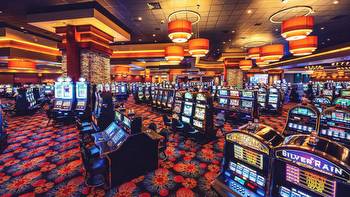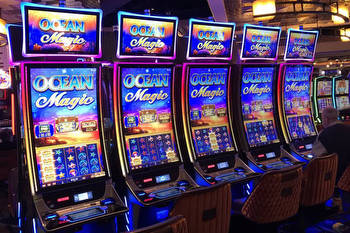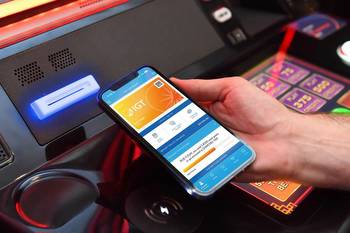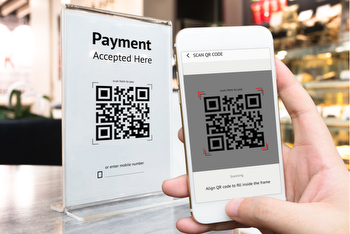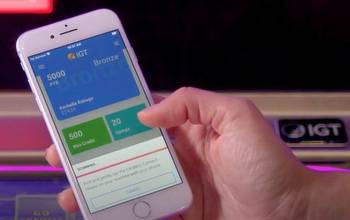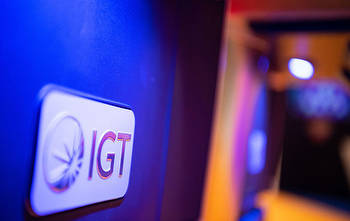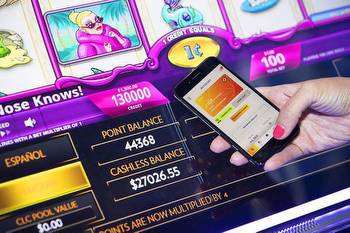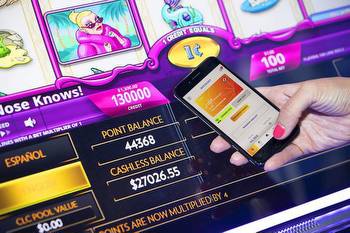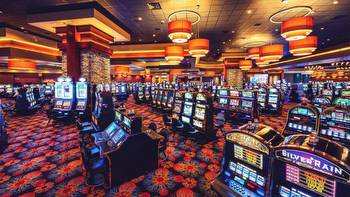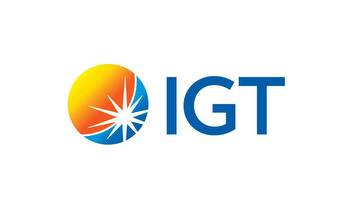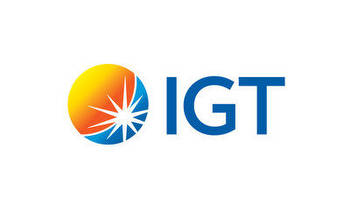Las Vegas casinos, late to the cashless game, appear ready to capitalize with young players


Rob Salassi, IGT senior project manager, demonstrates IGT’s cashless gaming app during Global Gaming Expo (G2E) at the Venetian Expo Tuesday, Oct. 11, 2022.
Monday, Oct. 17, 2022 | 2 a.m.
A short walk from the annual Global Gaming Expo last week, patrons on the Palazzo casino floor scurried about within the different clusters of slot machines.
A woman clutched a payout ticket in her hand as she got up from one machine to search for a new one hoping for better luck.
Rob Salassi, IGT senior project manager, demonstrates IGT's cashless gaming app during Global Gaming Expo (G2E) at the Venetian Expo Tuesday, Oct. 11, 2022.
Nearby, a man at one of the casino’s cash kiosks folded a stack of $20 bills he had retrieved before stuffing them into his pocket.
At casinos in Las Vegas and around the country, cash is still king, but there’s a steady drumbeat within the industry that continues to point to a change — cashless options are coming.
In some cases, they’re already here.
Resorts World, the newest megaresort on the Strip, is set up so gamblers — those with a Resorts World player’s card — can play slot machines and table games without using paper bills.
At G2E — the gaming expo and convention that attracted about 25,000 to the Strip — the cashless concept was again a hot topic at vendor booths, educational seminars and expert panels.
As transactions have steadily moved away from cash in nearly all facets of commerce in the U.S., the casino industry has generally been a bit slower to adapt.
Chris Justice, president of Global Payments Inc., a Georgia-based company with offices in Las Vegas, said the coronavirus pandemic helped the gaming industry move toward the cashless concept because many residents feared coming into contact with the virus by touching money or an unsanitized gaming chip.
“COVID was one of those catalysts that really sparked the cashless conversation in gaming,” Justice said.
According to the American Gaming Association, the industry’s national trade group, the commercial gaming industry topped $53 billion in combined revenues last year, which set a record.
The positive cashflow numbers, as Justice noted, could limit some operators’ motivation to change much of anything.
“I think operators are seeing better results, even with the fact that we might see a second year in a row of record revenues, from those who have cashless as a solution,” Justice said. “The pendulum is still going back to the fact that consumers don’t want to stand in line, don’t want congested spaces, and don’t want face-to-face conversations.”
Just before the G2E convention, International Game Technology (IGT) announced that its Resort Wallet and IGTPay cashless gaming systems would be available at the six Station Casinos properties in Las Vegas.
Customers are now able to use the Station Casinos “STN Cash” smartphone application, which is available through Apple or the Google Play store, to “tap into” a slot machine.
Think of it as the same as a Bluetooth connection between a smartphone and a pair of wireless headphones.
As of now, the cashless system is only for slot machines, but Jacob Lanning, senior director of business development for payments at IGT, said it’s expected that gamblers will eventually be able to use cashless technology to play table games as well.
Through IGTPay, customers can link their bank account or connect with other e-wallet options such as PayPal to draw funds.
Lanning said IGT has also partnered with a tribal casino in Oklahoma to offer the cashless payment systems. Other casinos in Las Vegas could follow, he said.
“There are additional potential customers in the pipeline who are interested in deploying this technology over the coming months and years,” Lanning said. “This is a competitive space. There are a lot of companies looking to provide solutions.”
Lanning said IGT, which operates numerous casino content management systems, has seen that it’s not only young casino patrons who are clamoring for cashless options.
“What we’re seeing from the player base is that it’s not an older or younger thing,” Lanning said. “The reality is that everybody is using cashless solutions to pay for their coffee or their groceries or their haircut. It’s very unlikely now that people outside of the casino are walking around with cash in their everyday lives.”
A long-held argument by some is that cashless payment options make it more difficult to combat problem gambling.
Justice, however, said he doesn’t subscribe to those concerns.
“Responsible gaming is something that everyone pays a lot of attention to,” Justice said. “The approach today for responsible gaming is to apply friction to everybody because somebody’s going to have a problem. The unfortunate part is that most addicts will leap those hurdles. Mobile gives us an opportunity to understand behavioral analytics better. People can address that in a private and confidential way, people can set limits.”
Justice said Global Payments, which does business with some of the top casino companies in Las Vegas in the sports betting application space, is set to open a Nevada field trial for its cashless casino product.
In the next four years, Justice said he expects over 90% of casinos in America to feature some form of a “cashless solution” for payments on a casino floor.
If that holds true, it will be a big change for an industry that not very long ago catered to customers who carried around plastic buckets full of coins.
Tim Cotton, an information technology audit manager with the National Indian Gaming Commission, might have said it best during a cashless payments panel discussion at G2E.
“When it was coins, you would look down at your hands after handling those coins and they would be a different color,” Cotton said. “It’s all different now. Younger folks are used to these new cashless technologies. There are some major benefits there with cashless technologies.”
In rare instances, some casinos — the El Cortez in downtown Las Vegas is one — still have some coin slot machines, which are popular mostly with seniors.
It’s possible that use of greenback bills at machines and table games will be just as rare years down the line.
As innovations pop up, habits change, even in a business as traditionally set in its ways as the casino business.
It’s common for a slot machine player to cash a ticket at a kiosk instead of a cashier’s window, though that, Justice said, only became universally popular a few years ago.
“I don’t think there will be a time when everybody says they’re no longer going to accept anything else but this electronic mechanism,” Justice said. “From the responsible gaming aspect, though, to so many other areas, cashless is better for all stakeholders.”








